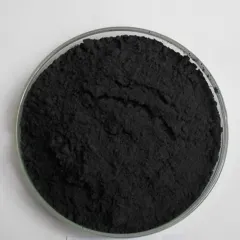Overview of nitride powder:
Nitride powder is a metal powder or ceramic widely used in many technical fields, and has become a high-tech material in the engineering ceramics industry. Metal nitride powders are similar to metals in terms of appearance, hardness, and electrical conductivity, and generally have high hardness, high melting point, stable chemical properties, and electrical conductivity.
Titanium, vanadium, zirconium, tantalum and other nitrides are hard and refractory, and have the characteristics of chemical corrosion resistance and high temperature resistance. Titanium nitride is a good conductor of heat and electricity, and zirconium nitride is superconducting at low temperatures.

Application of Nitride powder:
Among them, aluminum nitride (AlN) is known for its excellent thermal conductivity and good chemical resistance; boron nitride (BN) is known for its softness and lubricating properties. Silicon nitride (Si3N4) is an excellent choice for sintered bodies requiring good thermal shock resistance and high fracture toughness. In addition, a full range of nitrided ceramic materials for various industrial applications is available. Calcium nitride (Ca3N2), as an important chemical reagent, is widely used in the chemical industry and has important uses in the chemical industry. Active nitrogen ions can be obtained by using calcium nitride. Zirconium nitride is used as a reactor material.
Nitride powder supplier:
We are a new material supplier specializing in various nitride powders, such as calcium nitride (Ca3N2), lithium nitride (Li3N), silicon nitride (Si3N4), aluminum nitride (AIN), zirconium nitride (ZrN) , titanium nitride (TiN), etc. Email us or click the desired product to send an inquiry.

Payment Term:
T/T, Credit Card, Western Union, Paypal etc.
Term for delivery:
By air, courier or by sea according to the needs of the customer.
Conditions of storage:
1.) Maintain a dry area at the temperature of room.
2.) Avoid high and damp temperatures.
3.) Utilize immediately following the opening of the bag inside.
FAQ:
Q1:
What is carbide powder?
Re:Carbide powder has high hardness and good wear resistance and is widely used in cutting tools, molds, wear parts, and other fields. There are many methods for preparing carbide powders, including mechanical alloying (MA) and self-propagating high-temperature synthesis (SHS). There are many kinds of carbide powder, including titanium carbide powder, zirconium carbide powder, tungsten carbide powder, silicon carbide powder, and so on. The preparation methods of these powders are different, but most of them need to go through raw material selection, batching, melting, crushing, screening, surface treatment, and other processes. The appearance of the carbide powder is black or gray, with a metallic luster.
Q2:
What kind of carbide is the hardest?
Re:The hardness of carbide depends on the coordination number of carbon elements in the carbide and the atomic radius of the alloying element. Among all carbides, tungsten carbide (WC) has a reasonably high hardness, Mohs hardness is about 9, and its hardness also decreases less at 1000 ° C. Tungsten carbide is a refractory metal compound with high hardness, high wear resistance, high corrosion resistance, and other characteristics, widely used in cutting tools, abrasives, wear parts and other fields.
In addition, cubic boron carbide (BC) is also the hardest known carbide, with a hardness of up to 3000-4000HV, much higher than that of other carbides. Cubic boron carbide is widely used in abrasive materials, cutting tools, wear parts, and other fields.
Q3:
What is the hardness unit of carbide?
Re:The hardness unit of carbides is "Vickers hardness," usually denoted by the symbol "HV." Vickers hardness is a hardness value obtained by comparing the surface appearance of the indentation or the surface appearance of a similar artifact with the indenter of a specific shape and quality pressed into the surface of the sample under a certain pressure and holding it for a specified time.
The advantage of the Vickers hardness test is that it can measure a variety of different materials and samples of various sizes, the indentation is relatively small, and the damage to the surface of the sample is also tiny. Therefore, Vickers hardness has been widely used in material science and industrial production.
Q4:
What's the difference between carbides and other metals?
Re:Chemical composition: Carbides are mainly composed of carbon and other elements, such as titanium carbide, tungsten carbide, and so on. Other metals are made up of the metal elements themselves, such as iron, copper, and aluminum.
Hardness: Carbides usually have very high hardness. For example, tungsten carbide and cubic boron carbide are the hardest known carbides; their hardness is much higher than that of other metals.
Density: The density of metals is usually more prominent, while the density of carbides is relatively tiny. For example, titanium carbide has a density of only 4.9 grams per cubic centimeter, much lower than that of most metals.
Electrical conductivity: Metals generally have good electrical conductivity, while carbides have poor electrical conductivity. This is mainly because there are a large number of covalent bonds in the crystal structure of the carbide, which hinders the flow of electrons.
Q5:
What are the applications of carbides?
Re:Field of wear parts: carbide can be used to manufacture various wear parts, such as grinding balls, grinding discs, grinding rods, etc. Thanks to their high hardness and wear resistance, carbide wear-resistant parts enable efficient grinding and extended service life.
Manufacturing superhard materials: Carbides can be combined with other elements to form superhard materials, such as diamonds, cubic boron nitride, and so on. These superhard materials are widely used in mining, oil drilling, machining, and other fields.
Aerospace field: Carbides have high melting points, high thermal conductivity, and other properties, so they can be used in the aerospace field to manufacture high-temperature components and radiators.
Electronics industry: carbides can be used to manufacture electronic components and integrated circuits in the electronics industry, mainly using their high melting point and high conductivity characteristics.

